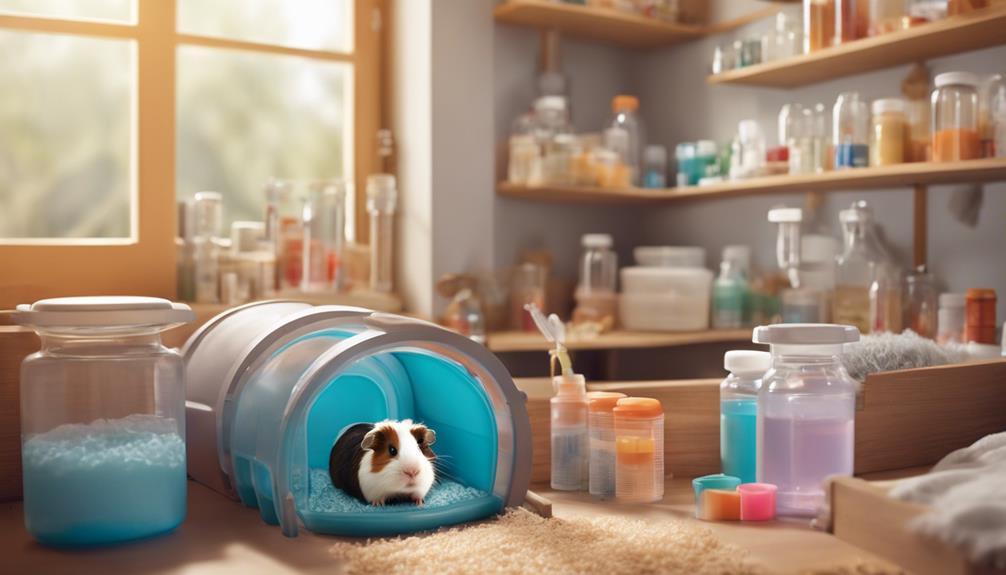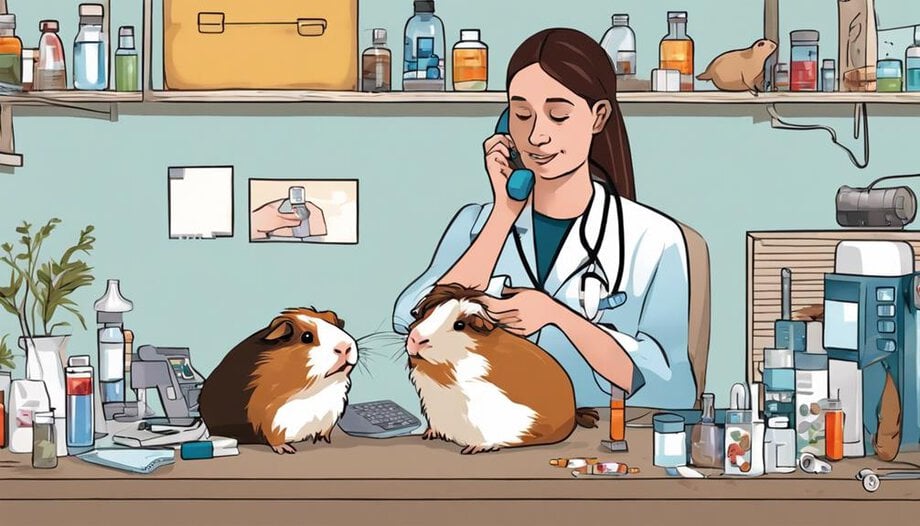How to Safely Administer Medication to Your Guinea Pig

Administering medication to your guinea pig requires careful attention to detail and proper technique. Before starting any treatment, it is essential to consult with a veterinarian to ensure the correct medication and dosage are being used.
When administering medication, always follow the veterinarian's instructions precisely. This includes the dosage amount, frequency of administration, and duration of treatment. It is crucial to give the medication at the same time each day to maintain consistency and effectiveness.
To make the process easier, try to establish a routine for medication administration. This can help reduce stress for both you and your guinea pig. Always monitor your guinea pig for any adverse reactions to the medication and consult with your veterinarian if you have any concerns.
Remember to store all medications safely, out of reach of children and other pets. Properly dispose of any expired or unused medication according to guidelines provided by your veterinarian or local authorities. By following these essential steps, you can ensure safe and effective treatment for your guinea pig.
Key Takeaways
- Consult a vet for medication guidelines and adjustments
- Handle medication carefully and store properly
- Create a calm environment for stress-free administration
- Monitor closely, seek veterinary advice, and maintain follow-up care
Understanding Your Guinea Pig's Medication Needs
To guarantee the well-being of your guinea pig, it's essential to understand their specific medication needs and how to safely administer them. When it comes to medication compatibility, always consult with a veterinarian before giving any new medication to your guinea pig, as some drugs can interact negatively with others. Additionally, dosage adjustments should only be made under veterinary guidance, as guinea pigs are sensitive to medications, and even small changes can have significant effects.
Proper medication storage is vital to maintain its effectiveness and safety for your pet. Store all medications in a cool, dry place away from direct sunlight, and always check the expiration date before administering. Additionally, handling instructions must be strictly followed to guarantee accurate dosing and prevent contamination. Administering medication to your guinea pig requires precision and care, so take the time to understand their medication needs thoroughly.
Preparing the Medication and Supplies
Preparing medication and supplies for your guinea pig requires careful attention to detail and organization. To guarantee a smooth and safe administration process, follow these key steps:
- Medication Storage and Preparation: Store all medications in a cool, dry place away from direct sunlight, and make sure they aren't expired. Before administering any medication, read the instructions thoroughly to understand the dosage and any specific preparation requirements. Use a clean syringe or dropper to measure the correct amount of medication.
- Safety Precautions and Handling: Wash your hands before handling any medication or supplies to prevent contamination. When preparing the medication, work in a quiet and calm environment to reduce stress on your guinea pig. Always handle the medication gently and with care to avoid spills or accidents.
- Organizing Supplies: Keep all necessary supplies such as syringes, medication bottles, and treats in one designated area to streamline the administration process. Having everything prepared and within reach will make the task easier and less stressful for both you and your guinea pig.
Setting up a Comfortable and Safe Environment

Creating a cozy and secure environment is crucial for guaranteeing the well-being of your guinea pig during medication administration. When setting up the space, consider establishing a quiet area free from loud noises or sudden movements to help keep your furry friend calm. Providing a comfortable and familiar environment can help diminish stress for your guinea pig during this time. Incorporating distraction techniques, such as offering their favorite treats or toys, can also help divert their attention while administering the medication.
To further assist you in creating a safe and cozy space for your guinea pig, here is a helpful table outlining key points:
| Creating a Cozy Space | Distraction Techniques |
|---|---|
| Provide a warm and soft bedding | Offer favorite treats |
| Ensure proper ventilation | Use interactive toys |
| Dim the lights to reduce glare | Engage in gentle petting |
| Place the cage in a quiet area | Play soothing music or sounds |
Handling Your Guinea Pig With Care
When handling your guinea pig with care, remember to approach them calmly and gently to confirm their comfort and safety. Guinea pigs are delicate creatures that require gentle handling to make sure they feel secure and at ease. Here are three essential tips for handling your guinea pig with care:
- Use Gentle Restraint: When picking up your guinea pig, support their body with both hands to prevent them from feeling insecure or scared. Avoid sudden movements or squeezing that could cause distress.
- Maintain Calm Interaction: Speak softly and move slowly around your guinea pig to create a soothing environment. Avoid loud noises or sudden gestures that could startle them.
- Respect Their Boundaries: Pay attention to your guinea pig's body language. If they show signs of discomfort, such as teeth chattering or trying to escape, gently place them back in their enclosure and try again later.
Administering Oral Medication

When administering oral medication to a guinea pig, it's vital to make sure the proper dosage is measured accurately to avoid any risks or complications.
Encouraging medication acceptance can be achieved by mixing it with a favorite treat or food that the guinea pig enjoys, making the process more pleasant for both the pet and the owner.
Proper Dosage Measurement
To guarantee accurate dosage administration when giving oral medication to your guinea pig, always use a reliable syringe or dropper. Here are some essential tips for proper dosage measurement:
- Dosage Accuracy: Follow the veterinarian's instructions carefully to assure the correct amount of medication is given.
- Syringe Technique: Use a syringe with clear markings and deliver the medication slowly into the side of your guinea pig's mouth to reduce the risk of aspiration.
- Weight Consideration: Take into account your guinea pig's weight when calculating the dosage, as medication requirements can vary based on their size.
Encouraging Medication Acceptance
Encouraging your guinea pig to accept oral medication can be achieved by incorporating it into their favorite treat or snack. By creating positive associations, medication acceptance can become easier for even the most reluctant guinea pigs. Here are some medication encouragement techniques to help your furry friend take their medicine without fuss:
| Medication Encouragement Techniques | Description |
|---|---|
| Hide in a favorite veggie snack | Mix the medication with a leafy green or carrot slice. |
| Use a syringe with a tasty liquid | Administer the medication through a syringe filled with fruit juice. |
| Offer a small piece of fruit afterwards | Reward your guinea pig with a tasty treat post-medication. |
| Wrap in a small piece of bread | Conceal the medication in a small bread ball. |
| Administer before mealtime | Give the medication right before feeding to associate it with mealtime. |
Administering Eye and Ear Medication
When administering eye medication to your guinea pig, proper application of eye drops is essential for effectiveness.
Similarly, when applying ear medication, mastering the technique for inserting ear solution correctly is vital.
Always handle medication safely to prevent any accidental harm to your pet.
Eye Drops Application
When administering eye drops to your guinea pig, gently hold the guinea pig still and approach from the side to apply the medication accurately. To guarantee successful eye drops application, consider the following techniques:
- Proper Positioning: Position your guinea pig in a comfortable and secure manner to prevent sudden movements that may disrupt the process.
- Gentle Application: Be gentle and calm while administering the eye drops to avoid stressing your guinea pig, which can make the process more challenging.
- Avoiding Stress: Create a quiet and soothing environment to help keep your guinea pig relaxed during the administration of the eye drops.
Ear Solution Technique
To smoothly shift from giving eye drops to applying ear medication to your guinea pig, make sure your guinea pig is comfortably positioned and secured to facilitate the process. When it comes to ear cleaning, using a specialized ear solution recommended by a veterinarian is crucial. Gently lift the outer ear flap and apply the prescribed amount of solution into the ear canal. Then, massage the base of the ear to help distribute the medication. This technique guarantees proper medication absorption and helps maintain your guinea pig's ear health. Remember to follow your vet's instructions carefully to avoid any discomfort or complications.
| Ear Solution Technique | |
|---|---|
| Step 1 | Comfortably position your guinea pig. |
| Step 2 | Lift the outer ear flap gently. |
| Step 3 | Apply the prescribed ear solution. |
| Step 4 | Massage the base of the ear. |
Handling Medication Safely
For safe and effective administration of eye and ear medication to your guinea pig, make sure you handle the medication with care and follow the prescribed techniques diligently.
When it comes to handling medication safely, consider the following:
- Medication Storage: Store the medication as per the instructions provided, making sure it's in a cool, dry place away from direct sunlight.
- Disposal: Dispose of any expired or unused medication properly following local guidelines to prevent accidental ingestion by pets or humans.
- Side Effects Monitoring: Keep a close eye on your guinea pig after administering medication, watching for any unusual symptoms or behaviors and consult your veterinarian if you notice any concerning changes.
Monitoring Your Guinea Pig's Response
To guarantee the safety and well-being of your guinea pig, it's important to vigilantly observe and assess their response after administering medication. Monitoring progress and tracking changes in your guinea pig's condition is essential to make sure the effectiveness of the treatment. Observing behavior and noting reactions can provide valuable insights into how your guinea pig is responding to the medication.
Look for any signs of improvement, such as increased energy levels, improved appetite, or a decrease in symptoms. Conversely, be alert to any negative reactions, such as lethargy, loss of appetite, or unusual behaviors. Keep a record of these observations, including the date, time, and any relevant details, to help track your guinea pig's progress accurately.
If you notice any concerning changes or if your guinea pig's condition doesn't improve as expected, it's important to seek veterinary advice promptly. By staying attentive and proactive in monitoring your guinea pig's response to medication, you can help ensure their health and well-being.
Seeking Veterinary Advice and Follow-Up

After monitoring your guinea pig's response to medication, the next step is seeking veterinary advice and follow-up to guarantee their continued well-being. Veterinary consultation and follow-up care are essential aspects of ensuring your guinea pig's health when administering medication.
Here are three essential considerations to keep in mind:
- Consulting a Veterinarian: Prior to administering any medication to your guinea pig, it's advisable to consult a veterinarian specializing in exotic pets. They can provide guidance on the appropriate medication, dosage, and potential side effects, tailored to your pet's specific needs.
- Ensuring Medication Safety: Your vet will offer insights on how to safely administer the medication to your guinea pig. This includes proper handling techniques, storage instructions, and any precautions to take to prevent accidental overdosing or interactions with other medications.
- Follow-Up Care: Regular follow-up appointments with your veterinarian are essential to monitor your guinea pig's progress, adjust the treatment plan if necessary, and address any concerns or new symptoms that may arise. Consistent follow-up care plays an essential role in ensuring your guinea pig's well-being throughout the medication process.
Frequently Asked Questions
Can I Mix My Guinea Pig's Medication With Their Food or Water to Make It Easier to Administer?
When giving medication to a guinea pig, mixing it with food or water may seem convenient, but it's important to follow proper guidelines for dosage consistency. Alternatives like syringes or specialized treats can guarantee accurate administration without risking health.
How Often Should I Clean or Replace the Syringe or Dropper Used to Administer Medication?
Proper storage of syringes or droppers prevents contamination. Cleaning techniques vary; rinsing with warm, soapy water after each use is recommended. Replace if damaged or worn. Regularly inspect for cleanliness and functionality to secure effective medication administration.
Is It Safe to Give My Guinea Pig Medication Intended for Other Animals or Humans?
When considering giving medication meant for other animals or humans to a guinea pig, one must proceed with caution. Alternative dosages can be risky, leading to potential side effects. It's important to consult a vet for safe options.
Are There Any Specific Signs or Symptoms I Should Watch for That Indicate My Guinea Pig Is Having a Negative Reaction to the Medication?
Observing behavior is essential when administering medication to a guinea pig. Signs of negative reactions include changes in appetite, energy levels, or unusual behaviors. If any side effects are observed, seeking veterinary advice promptly is essential for the pet's well-being.
What Should I Do if My Guinea Pig Spits Out or Refuses to Take Their Medication?
If a guinea pig spits out or refuses medication, owners can try training techniques like mixing meds with tasty food or using a syringe. Alternative methods include seeking professional help for guidance on administering medicine effectively.











